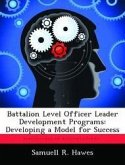Operations Desert Storm and Iraqi Freedom arguably demonstrated that the US Army dominates conventional conflict. This lethal capability of US forces was forged against a Cold War threat focusing on combined fires, swift military defeat of the enemy, and restaging forces to home stations. This model, rehearsed to perfection at the Combat Training Centers, developed highly capable warfighters. This did little to prepare the Army or its leadership for the decidedly non-conventional environments as presented in current operations. The convergence of Full Spectrum Operations, Network Centric Warfare, and Krulak's "Three Block War" have facilitated an urgent need for junior leaders that are more capable, adaptive, and mature in their abilities to lead in a fluid environment. Unlike previous conflicts, inexperienced junior leaders make daily tactical decisions that can have an impact on the success and direction of national and operational strategy. Junior officer education continues to focus almost exclusively on warfighting and branch specialization. It is imperative that the Army begins a generational transformation of the junior officer educational system that empowers the newest leaders to think creatively, in context with national strategy, possess adaptability, and effectively deal with ambiguity.
Hinweis: Dieser Artikel kann nur an eine deutsche Lieferadresse ausgeliefert werden.
Hinweis: Dieser Artikel kann nur an eine deutsche Lieferadresse ausgeliefert werden.








